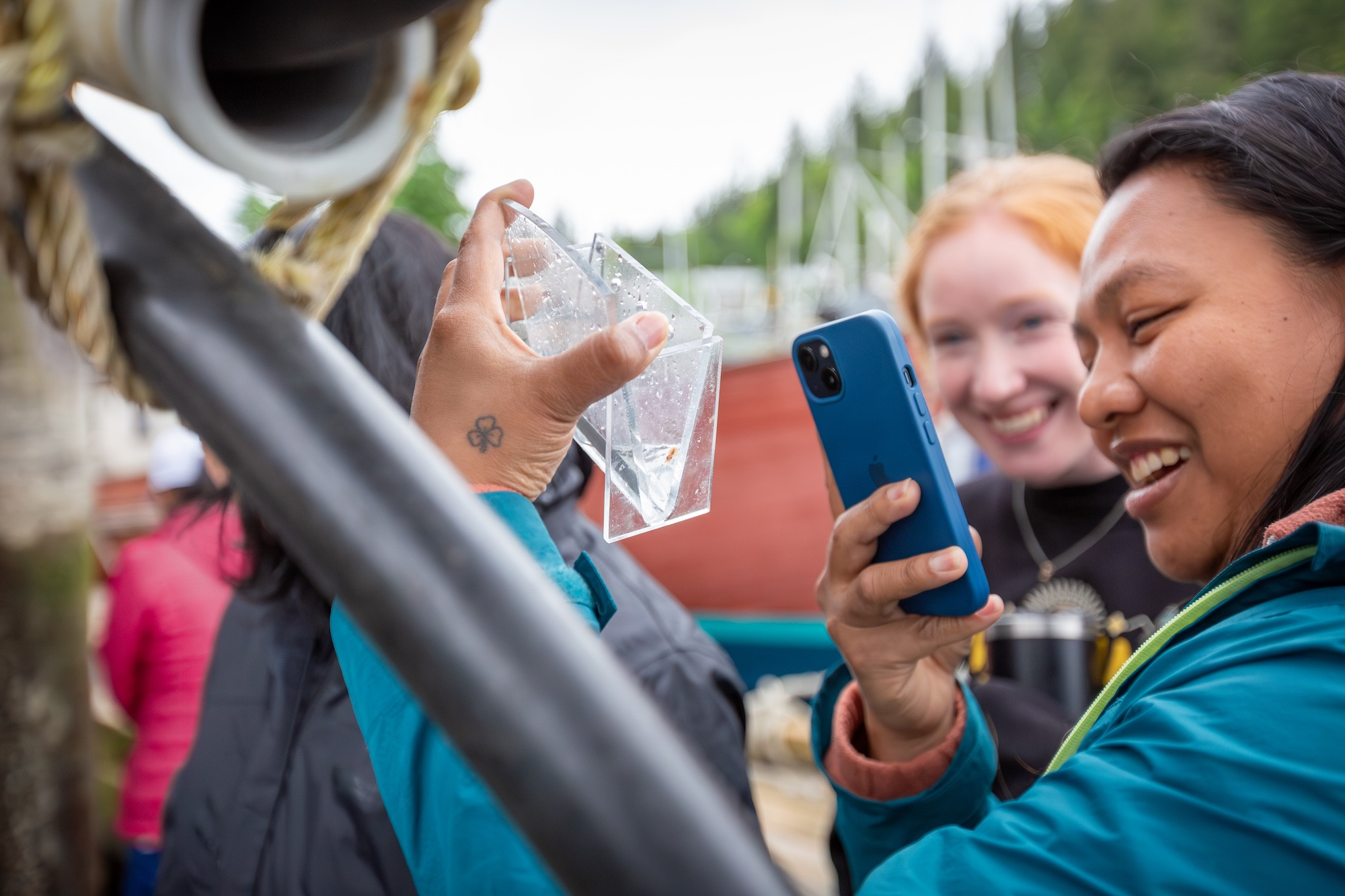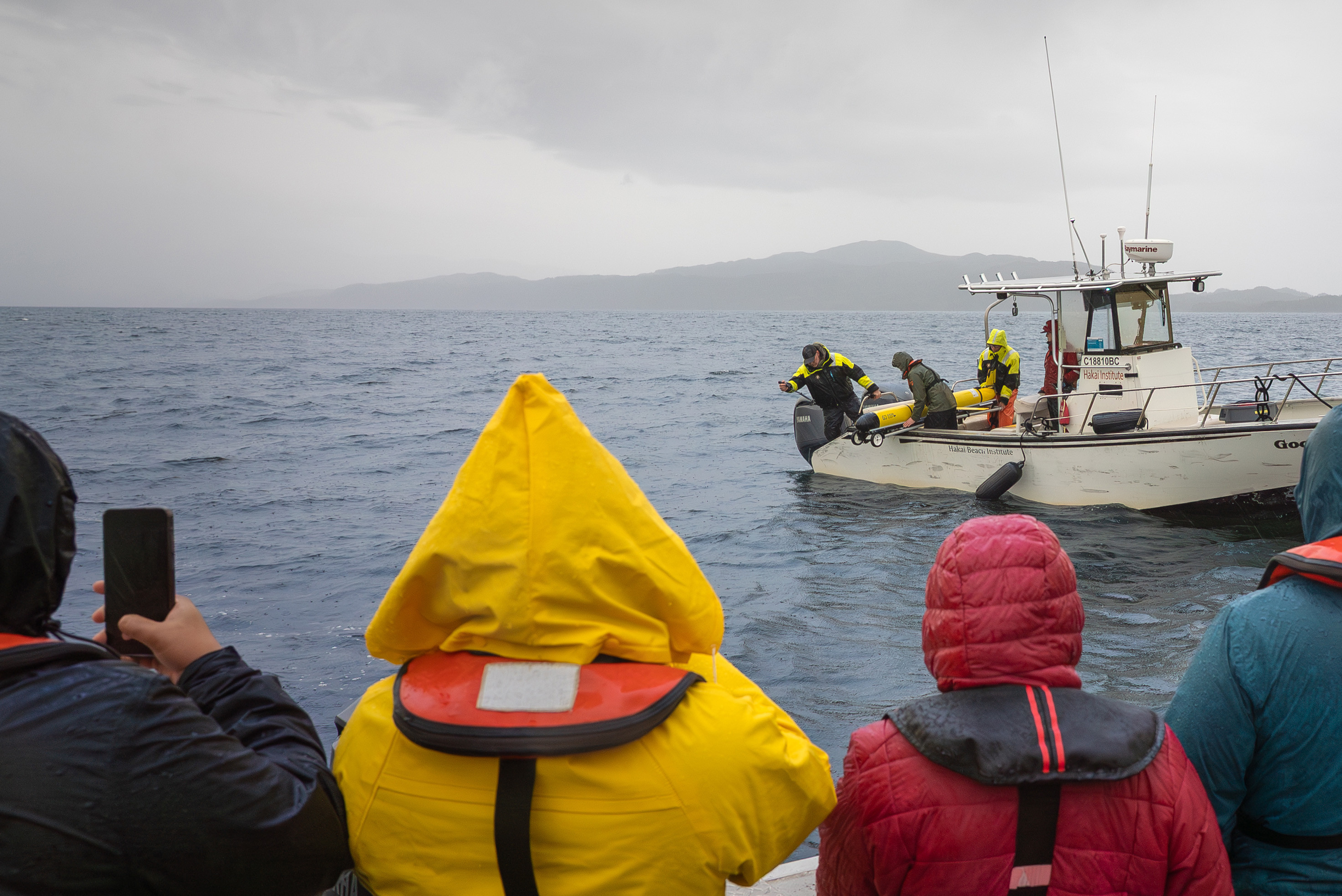August 11th, 2025
Lighting a Fire for Ocean Science
Ocean scholars from around the world wade into Canada’s coastal ecosystems for hands-on science that ignites a passion for the future.

Maryjune Cabiguin, a POGO scholar from the Philippines, examines some of the critters that accumulated in a light trap off the Quathiaski Cove dock near the Hakai Island Ecological Observatory on Quadra Island.
When Ratna Suhita zipped her suitcase shut in Bali, Indonesia, in the fall of 2024, her bag bulged with packets of chili pepper spice—fiery little reminders of home. She was heading to Canada for 10 months as one of 10 scholars in the 2025 cohort of the Nippon Foundation–Partnership for Observation of the Global Ocean (POGO) Centre of Excellence. It would be her first time outside the country and her first time experiencing winter. She didn’t want to be without heat.
Since 2005, POGO has been quietly transforming the field of ocean science. At its heart, the collaboration is about people—especially those from the Global South. It’s about training ocean-minded thinkers, doers, and future leaders to monitor the sea with the tools of today and the perspective of their home regions. While it focuses on developing nations, the ripple effect is global; the program is training a new generation to listen more closely to the sea, and to bring those observations back to shore in meaningful ways.
For Suhita, a master’s student studying remote sensing and GIS, the most rewarding part of the program wasn’t the lectures at Memorial University in St. John’s, Newfoundland, or Dalhousie University in Halifax, Nova Scotia—or even the snow, which she enjoyed for the first time in her life. What really lit her fire was the time with the Hakai Institute on Canada’s west coast.

POGO scholars—including José Manuel (front center), Esraa AbouElmaaty (back center), and Punya Puthukulangara (far right)—learn the ins and outs of rocky intertidal surveys with Hakai Institute researchers.
“We've been informally calling this segment ‘The Field School,'” says Kacie Conrad, one of the project managers from the Hakai Institute overseeing day-to-day life for the scholars. She adds that Hakai’s researchers have been enthusiastic and creative about how to invite the scholars into their areas of expertise.
The scholars’ time at the Hakai Institute was a whirlwind of salty air, slick kelp, and tech talk. During their two weeks on Quadra Island, they scrambled along the coastline doing intertidal biodiversity surveys that culminated in a mini bioblitz, where they recorded as many species as possible to get a snapshot of the local biodiversity. They also enjoyed workshops on geospatial technology that spun satellites and sensors into storytelling tools.
For Maryjune Cabiguin, a scholar from the Philippines with a biology background, it was the state-of-the-art aquaria called mesocosms that got her mind racing. They're a step up from the experiments on community ecology she ran at home using more manually controlled aquarium heaters to control for water temperature.
“When we are in our respective countries … I just think, what more could we do if we had these kinds of resources?” she asks.
Then came Calvert Island, British Columbia: remote, rugged, and dripping with West Coast mystique. There, amid the clouds of blackflies and persistent drizzle, the cohort teamed up with the Hakai Institute’s watershed and ocean observation crew—even getting to launch buoys and gliders, autonomous underwater vehicles, into the sea.

A little rain is no deterrent for the Hakai Institute’s oceanography team to deploy an ocean glider off Calvert Island, British Columbia, in front of an audience of POGO scholars.
Organizers made sure scholars spent time moving across the land and sea, paddling coastal routes by kayak and walking terrain shaped by salt, storms, and time. The goal wasn’t just to attain technical skills—it was to gain orientation, a geographic grounding. Participants walked away with a visceral sense of why these field stations are so well placed for watching the ocean breathe.
“It’s not educational per se. It’s just giving them that full picture of why this is the coolest location to do what we do,” says Naomi Boon, who helps Conrad oversee the program, a job that requires the logistical mind of an air traffic controller and the enthusiasm of a camp counselor—especially on cold rainy days.
Despite the bugs and rain, Ndague Diogoul, an oceanographic researcher from Senegal, found the excursion with the watersheds crew revelatory.
“After our experience at Hakai … I think when I go back to my home I won’t be able to stay in the office,” she says. “Doing research in Canada is very different from what we do.”
Dennis Otieno, a scholar from Kenya with a career that pinballs from oceanography to banking to entrepreneurship, says the program is helping him reimagine the shape of research itself.
“One thing I realize,” he says, “is you can’t work alone—and you can’t know everything.”

Ndague Diogoul, an oceanographer from Senegal and POGO scholar, uses a microscope to examine specimens collected during a mini bioblitz on Quadra Island.
Growing up near Lake Victoria, the second largest freshwater lake in the world after Lake Superior, Otieno learned early about the power of water to connect and sustain. Now, with an eye on Kenya’s blue economy, he’s focused on building capacity at home through collaboration.
“Knowledge is something where it doesn’t really matter how many papers you publish. What matters is what impact it has, and whether it informs policies,” Otieno says.
The Hakai Institute is committed to at least another two years with POGO and to making the program a success in Canada—so next year promises a new set of adventures.
“We all recognize the cost-effectiveness and efficiency of making ocean observations remotely, via autonomous systems, modeling, and artificial intelligence,” says Eric Peterson, cofounder and codirector of the Tula Foundation.

POGO scholars deboard the floatplane as they take in their first view of the Hakai Institute’s Calvert Island Ecological Observatory.
“At the same time, we need to anchor our knowledge in specific locations around the globe that we monitor long term and across the spectrum of science. We welcome our Nippon-POGO scholars, providing them with exposure to field science outside the academy, and perhaps inspiring other centers in the same spirit in other ocean nations,” says Peterson.
For this crew of scholars, scattered across the globe but drawn together by the ocean’s pull, the work is only beginning. And while they’ll soon return home with suitcases emptied of chili pepper packets, they’ll possess a new kind of fire to inspire their research and innovation.